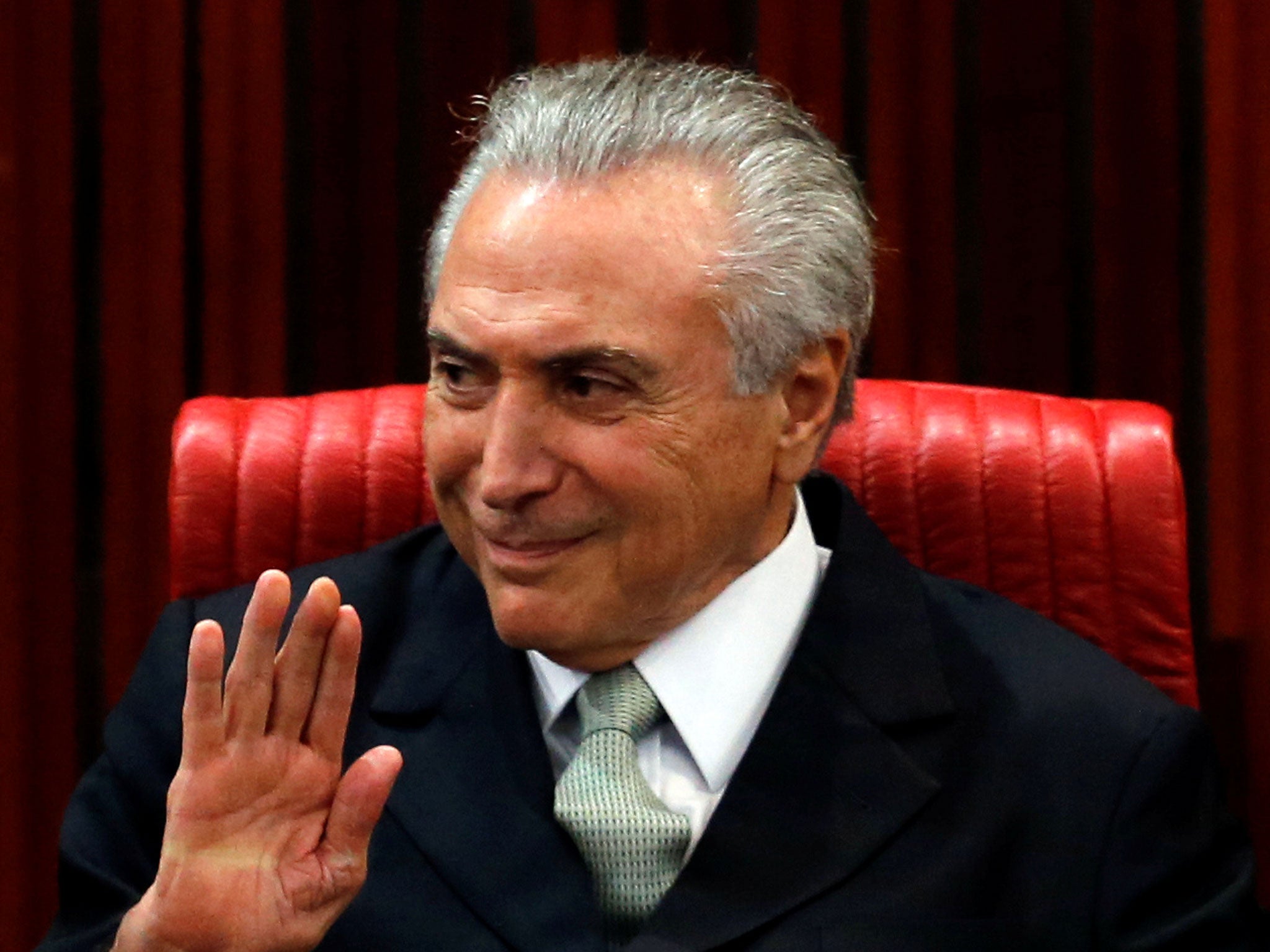Brazil's new leader holds first cabinet meeting as he seeks to 'unify' the country
Michel Temer has taken over as president following the suspension of Dilma Rousseff

Brazil's acting president, Michel Temer has held his first official cabinet meeting vowing the new team will try to rescue the country's plunging economy.
The gathering at the government headquarters on Thursday followed a chaotic day that saw the Senate vote to impeach President Dilma Rousseff, suspending her from office and abruptly ousting nearly her entire government - a move she branded “a coup”.
Mr Temer said that an "urgent" task wast "to pacify the nation and unify the country,” after Ms Rousseff's suspension.
Mr Temer moved quickly to announce his new team, whose star appears to be Finance Minister Henrique Meirelles, widely respected for serving as Central Bank chief during the boom years from 2003 to 2010.
“Our biggest challenge is to stanch the process of freefall of our economy,” Mr Temer said at a swearing-in ceremony for the 22 ministers. “First of all, we need to balance our public spending. The sooner we are able to balance our books, the sooner we'll be able to restart growth.”
He also promised to support the widening investigation into corruption at the state oil company that has already embroiled leading politicians and even implicated Mr Temer himself. Mr Temer denies any wrongdoing.
Mr Meirelles said that he will seek to tackle pension reform and labour law reform, signalling potentially sensitive changes for a sputtering economy
Mr Meirelles told a news conference that he would work on reforms of a costly pension system that allows many people to retire in their 50s.
“Retirement must be self-sustaining over time,” said Mr Meirelles. He also said Brazil needs to raise worker productivity, “and this comes through labour law” changes.
However, Mr Temer’s choice of ministers raised criticism for its makeup: All its members are middle-aged or elderly white men - a particularly sore point in this majority non-white country.
“It is a very conservative, very religious cabinet, with no black [people] and no women,” said Francisco Fonseca, a political scientist at the Fundacao Getulio Vargas think tank
Six women were in Ms Rousseff's Cabinet when she began her second term last year.
Mr Temer made a bid for peace with Ms Rousseff, offering his “institutional respect” for the suspended leader, who continues to live in the presidential residence even as her replacement holds down the government offices.
“This is not a moment for celebrations, but one of profound reflection,” he said.
Ms Rousseff, however, vowed to fight her ousting, calling it “a coup” led by a social and economic elite that had been alarmed by the policies of her leftist Workers' Party, which had held power for 13 years.
Ms Rousseff warned that Mr Temer plans to dismantle government social programs that benefit around one-fourth of the Brazilian population. He insisted the programmes would be maintained and “perfected” under his leadership.
But his choice to lead the Social Development Ministry, Osmar Terra, acknowledged that could be tough.
“What President Michel is proposing is that those programs be the most sheltered (from cuts). But if the budget hole is very big, we'll see,” he said. “The country is bankrupt.”
Ms Rousseff, whose popularity plummeted amid the worst recession since the 1930s, is accused of using illegal accounting tricks to hide large deficits in the federal budget. Opponents argue that damaged the country, but Brazil's first female president denies any wrongdoing, having called it baseless pretext by the elite to snatch back power.
The finance minister Mr Meirelles said the government is ready for protests over its proposals, acknowledging, “The debate will be quite intense.”
Ms Rousseff will be suspended for as long as 180 days pending a trial in the Senate. If two-thirds of the 81 senators vote to find her guilty, Mr Temer would serve out the remainder of her term, which ends in December 2018.
Mr Temer, the longtime leader of the centrist Democratic Movement Party, had been Ms Rousseff's vice president as part of a coalition of convenience that broke down under the strains of economic woes and corruption scandals.
Mr Temer has been implicated by witnesses in the Petrobras scandal, but he has not been charged. The impeachment drive's main motor, former House Speaker Eduardo Cunha, has been charged in the scandal and was suspended last week as speaker over allegations of corruption and interfering with justice.
The acting president pledged that the investigation will continue unimpeded. “It deserves to be followed closely and protection against any interference that could weaken it,” he said.
Associated Press
Subscribe to Independent Premium to bookmark this article
Want to bookmark your favourite articles and stories to read or reference later? Start your Independent Premium subscription today.

Join our commenting forum
Join thought-provoking conversations, follow other Independent readers and see their replies